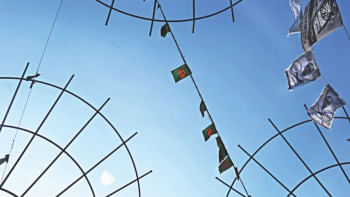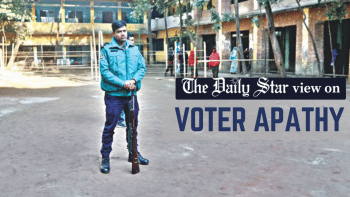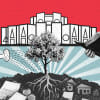How to explain Jamaat’s return to the political scene?

Jamaat-e-Islami, one of the largest fundamentalist parties in Bangladesh, was recently allowed to hold a public meeting in Dhaka after almost a decade. The official permission from police to hold the rally has led to numerous questions and, pending any clear answers, much speculation.
A day after the rally, ministers and senior leaders of the ruling Awami League came out with various statements seeking to give some explanation. Perhaps the most important remark was made by the Minister of Agriculture Abdur Razzak, who said that allowing Jamaat to hold a rally in Dhaka was a "political decision." That term alone raises questions across at least two fronts: what prompted Awami League to take such a decision, and what does the government want to achieve through this "political decision?"
Jamaat has faced a myriad of challenges since the BNP-led alliance, which included Jamaat, handed over power to a caretaker government in 2006. This was followed by a period of serious political clashes.
Over the next two years, amid a state of emergency, Jamaat's principal ally BNP's political capital appeared to have eroded substantially, so much so that Awami League won a landslide victory in 2008. The war crimes trials that soon followed saw the top leadership of Jamaat get executed for their crimes against Bangladesh and its people in 1971. Many of its leaders were also arrested between 2013 and 2015, when the BNP-Jamaat alliance staged a fierce campaign to thwart the elections.
Since 2013, Jamaat had not been allowed to hold any rallies. In fact, whenever they attempted to stage any kind of public demonstration, their leaders were summarily detained by law enforcers with a clear indication from the government that they would not be accorded such liberties. But after the announcement of the US visa policy, it seems Jamaat has been the only party that has been able to seize the opportunity to benefit from it.
There have been rumours that Jamaat had an "understanding" with the government, based upon which they were allowed to hold the rally. Awami League General Secretary Obaidul Quader, however, said that BNP had brought Jamaat out to the streets to carry out arson attacks – essentially evading the fact that it was his government that let Jamaat hold this particular rally.
Some members of Jamaat have been found guilty of committing war crimes. The organisation, as well as many of its leaders, had actively engaged against Bangladesh's liberation forces in 1971. The party also has a solid track record of carrying out arson attacks. So, why has the government suddenly become softer on the party?
When BNP boycotted the 1986 elections during the regime of military dictator HM Ershad, it was the Awami League and Jamaat that joined the polls and gave it legitimacy. Awami League and Jamaat waged a joint movement against the BNP government in 1995-96, demanding the introduction of the caretaker government system, which led to a constitutional amendment as well. If Awami League had found it expedient to join hands with Jamaat then, it may find it expedient to do so again.
The BNP, which was blamed for forming an alliance with a controversial party like Jamaat, had dissolved its grand alliance of 20 parties apparently just to rid itself of any links with Jamaat. Although not in any alliance officially, there have been reports that Jamaat and BNP resumed talks to simultaneously launch a one-point movement. So far, that seems to hold true, considering the kind of noises Jamaat is making – they want election under a caretaker government system.
Political commentators believe that the government has a political equation in mind. If BNP boycotts the polls, then the government will try to bring Jamaat into the election under a different name to make the election seem inclusive and participatory. Leaders of Jamaat have already applied to the Election Commission for registering a new political party, and there is a rumour that the Bangladesh Democratic Party will get registration.
Jatiya Party Chairman GM Quader recently said at a programme that there was much chatter and speculation around the political scene. He said the word was that Awami League would concede some constituencies to Jamaat. "They will give some seats to us too. 'Get more organised and you will get more seats too,' they said," Quader said at a party event. It is becoming increasingly clear that this time, getting re-elected would be challenging for the ruling party and it would not be possible to repeat what happened in 2014 or 2018.
If BNP and other political parties do not join the polls, the credibility of the election will be questioned to an extent that it might get branded as largely illegitimate. That leads to the obvious question as to whether the government is trying to bring Jamaat back into electoral politics to change this scenario. Many might dismiss this idea as mere conjecture, but Jamaat's intimacy with the ruling party is nothing new.
When BNP boycotted the 1986 elections during the regime of military dictator HM Ershad, it was the Awami League and Jamaat that joined the polls and gave it legitimacy. Awami League and Jamaat waged a joint movement against the BNP government in 1995-96, demanding the introduction of the caretaker government system, which led to a constitutional amendment as well. If Awami League had found it expedient to join hands with Jamaat then, it may find it expedient to do so again.
There is also a strong suggestion that the government's hands are tied and it was compelled to give permission to Jamaat in light of the US visa policy. Many believe that through this, the government wants to show that it is not obstructing any of its political opponents. Jamaat, on the other hand, needed to show that it was still present, and it most likely leveraged the benefit of the US policy. It must have been desperate to make a show. That is also important when one is playing the game of electoral politics.
In Jamaat's absence, the Bangladesh Islami Andolon appears to have taken over its vote bank, although both parties have distinct ideologies. But as far as Jamaat is concerned, their vote bank is being seriously eroded.
Founded by the controversial Islamist scholar Abul Ala Moududi in 1941, Jamaat had been banned twice in Pakistan – in 1959 and 1964 – for its communal role. During the Liberation War, the party had directly taken a stance against independence and provided the bulwark of Razakar, Al-Badr and Al-Shams militia and the notorious Peace Committee that collaborated with the Pakistani army to commit war crimes.
In 2013, Jamaat's registration as a political party was declared illegal by the High Court. Acting on the verdict, the Election Commission cancelled its registration in October 2018. But the government did not take any move to ban the party over these years. So, Awami League's intentions regarding Jamaat are still dubious at best. Jamaat, on the other hand, being politically savvy as always, has picked just the right time to indicate that it is ready to be courted.
Mohammad Al-Masum Molla is chief reporter at The Daily Star.

 For all latest news, follow The Daily Star's Google News channel.
For all latest news, follow The Daily Star's Google News channel. 










Comments